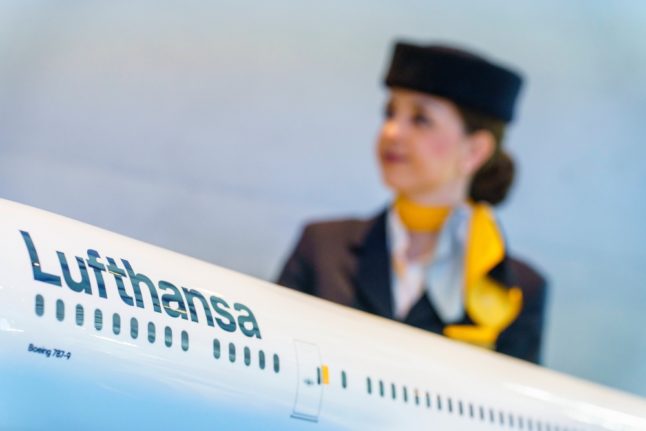The deal comes after Lufthansa ground staff also reached a pay deal last month, and is the latest positive news for travellers that have been hit hard by a series of travel strikes.
Lufthansa cabin crew at Frankfurt and Munich airports went on strike last month to push their demands, leading to widespread flight cancellations.
The agreement affecting around 19,000 flight attendants runs until the end of 2026, and comprises pay rises of eight percent this year, five percent next, and 3.5 percent in 2026, Lufthansa said.
It also includes a €3,000 bonus to compensate for the impact of higher prices.
“We fought hard to push through this [deal]”, said Harry Jaeger, lead negotiator from UFO, the union representing the cabin crews.
“It was not possible to avoid using industrial action to convince Lufthansa of the seriousness of our demands. However, we can now be very satisfied with the result.”
Lufthansa personnel chief Michael Niggemann said the agreement was good “for our colleagues in the cabin, who do an outstanding job every day, and also for our guests, who finally have planning certainty again”.
The deal means the cabin crew won’t go on strike over the busy summer holiday season, when Germany is also due to host the Euro 2024 football championships.
UFO members still need to approve it.
Are there any remaining labour disputes among airlines?
The agreement does not cover the employees of Lufthansa subsidiaries Cityline and Discover airlines. Ufo has reported progress in the talks on the respective company wage agreements, but no solutions have yet been found.
The ongoing dispute at the holiday airline Discover had also put a strain on the talks at the Lufthansa parent company. Pilots and flight attendants at the holiday airline, which was founded almost three years ago, want to push through their first collective agreements.
Recently several other ongoing wage disputes in the airline industry have been settled. Before the Easter holidays, Lufthansa and Verdi reached an agreement among Lufthansa ground staff with the help of arbitration.
Verdi members accepted it with a sweeping 94.5 percent approval. Pilots have been bound by a long-term collective labour agreement for several years.
Last weekend, a compromise was also reached through arbitration for the private aviation security staff at airports.
Throughout the first three months of the year, the three professional groups repeatedly took turns striking and paralysing large parts of German air traffic.
The Lufthansa group — whose carriers include Lufthansa, Eurowings, Austrian, Swiss and Brussels Airlines — had to be bailed out by the German government during the coronavirus pandemic.
But it has since bounced back strongly as travel has recovered, prompting unions to argue the airline is not passing on enough of its bumper earnings to its staff.
READ ALSO: Germany’s Lufthansa more than doubles profits as strikes cast shadow



 Please whitelist us to continue reading.
Please whitelist us to continue reading.
Member comments